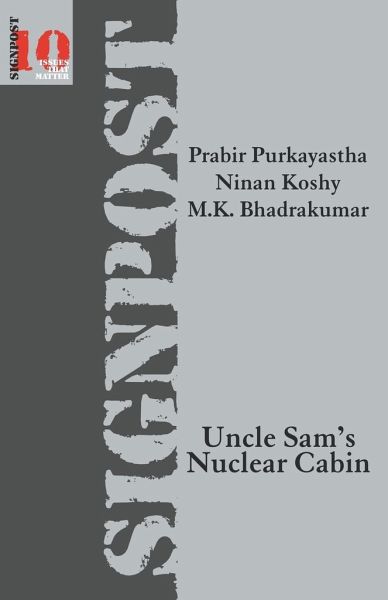
Uncle Sam's Nuclear Cabin
Versandkostenfrei!
Versandfertig in 1-2 Wochen
15,99 €
inkl. MwSt.

PAYBACK Punkte
8 °P sammeln!
The India-US nuclear deal polarized the country in an unprecedented manner. Proponents hail the deal as the outstanding achievement of the UPA government. Opponents argue that if operationalized, it will severely undermine India's independence in foreign policy, defence, and even in the field of nuclear technology itself, compromising years of hard work and impressive gains in a highly competitive global field. //How does the global nuclear technology control regime work? What gains have Indian scientists and technicians made in the face of nuclear sanctions following the tests of 1974 and aga...
The India-US nuclear deal polarized the country in an unprecedented manner. Proponents hail the deal as the outstanding achievement of the UPA government. Opponents argue that if operationalized, it will severely undermine India's independence in foreign policy, defence, and even in the field of nuclear technology itself, compromising years of hard work and impressive gains in a highly competitive global field. //How does the global nuclear technology control regime work? What gains have Indian scientists and technicians made in the face of nuclear sanctions following the tests of 1974 and again in 1998? What was the Indian expectation from the nuclear deal, and what has the US actually delivered? To what extent is the nuclear deal going to address India's energy needs, and at what cost? What had the Prime Minister assured Parliament with regard to the nuclear deal, and does the final deal stand up to his assurances? What is the relation between the Hyde Act and the 123 Agreement, and how does it impact India? Does it serve India's interests to play into the US plans to divide Asia into rival blocs? What are the larger geopolitics of Asia, and how can India benefit from a trilateral relationship with Russia and China? //Three leading experts investigate in lucid and accessible terms a range of complex questions. Power expert Prabir Purkayastha looks at the nuclear deal from a technoeconomic point of view; foreign policy expert Ninan Koshy looks at the wider implications of the nuclear deal; and former diplomat M.K. Bhadrakumar explores the fascinating geopolitics of Asia and India's current and potential role in it.












